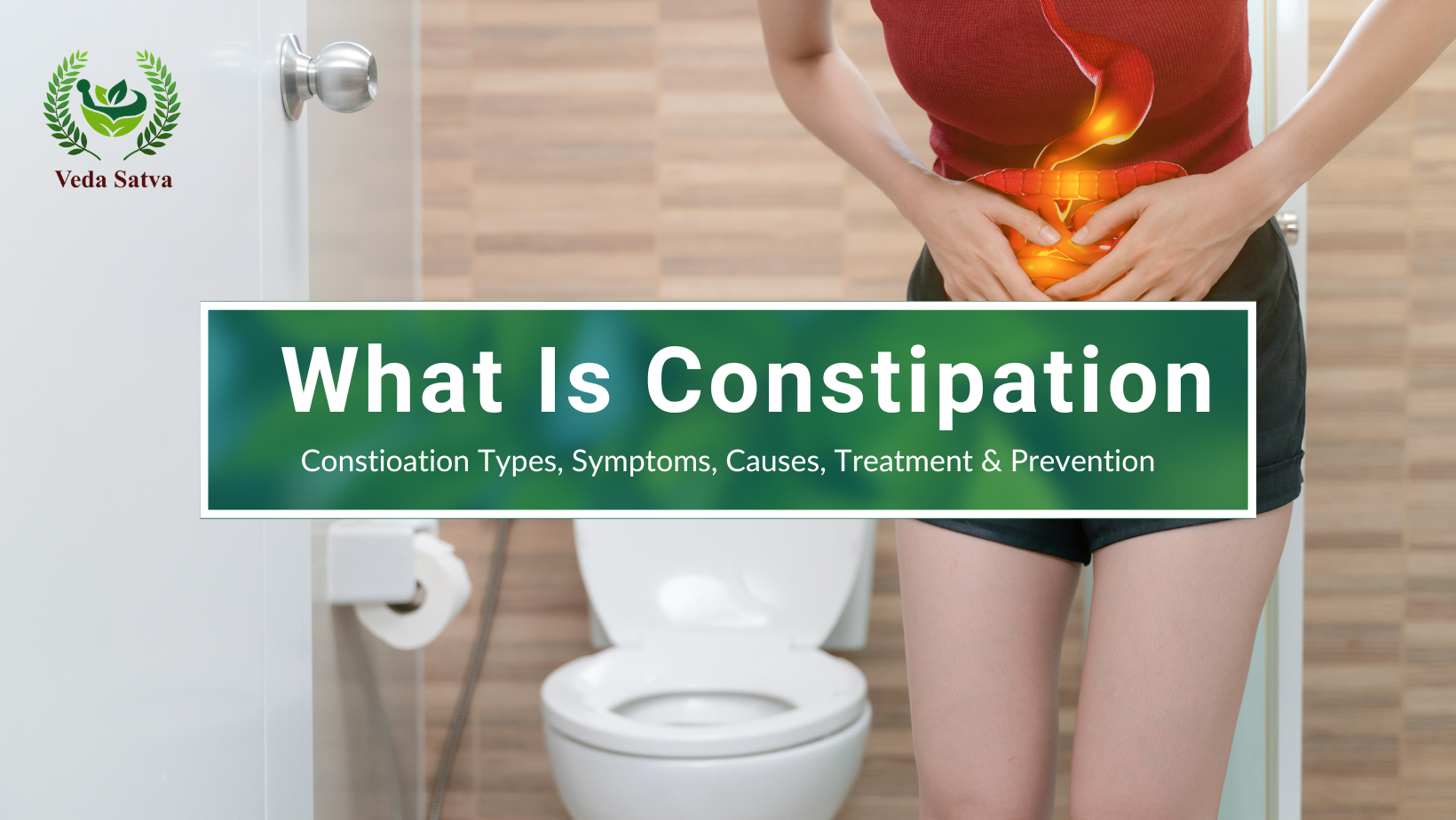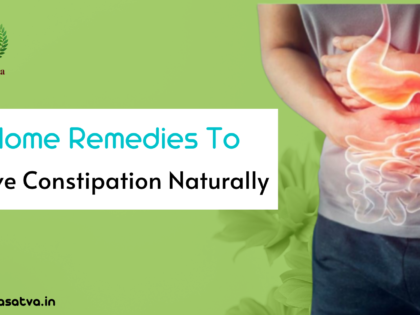What Is Constipation: Types, Symptoms, Causes, & Prevention
-
vedasatva@98727
- Posted on
- 0 comments

Constipation Overview
Constipation is a common problem that affects many people. It occurs when bowel movements become less frequent and stools become difficult to pass. It can happen due to changes in diet or routine, or due to inadequate intake of fiber.
Treatment depends on the cause. If the cause is a change in the diet, then a change in the diet may help resolve the constipation. If the constipation is due to inadequate intake of fiber, then increasing fiber intake may help.
What is constipation?
Constipation is a condition that occurs when the large intestine (the part of the gut that handles waste) does not have enough action or movement. People with constipation often experience difficulty going to the bathroom, feeling bloated, and having a hard time moving their bowels. This can lead to a lot of other problems, such as poor nutrition and an increased risk for health conditions like diabetes. Causes of constipation vary, but common factors include:
Insufficient fluid intake,
A lack of fiber in the diet
A history of gastrointestinal issues (like diarrhea)
Medications like statins, antidepressants, and beta blockers The good news is that there are many things you can do to improve your chances of resolving constipation. In general, eating more fiber-rich foods and drinking plenty of water can help you get relief from bowel problems.
Constipation is a problem with the bowel that can make it difficult to move waste through the digestive system. Symptoms of constipation may include occasional difficulty passing stools, feeling bloated after eating, having hard time getting to the toilet on time, and feeling pain when trying to pass stools. There are many factors that can contribute to constipation, including lifestyle choices, health conditions, and medications.
Types of constipation
There are many different types of constipation, each with its own unique symptoms. Some people experience mild constipation, while others experience chronic constipation that can cause significant discomfort. Constipation can be caused by a variety of factors, including lifestyle choices and medical conditions. Here are the three most common types of constipation: functional, straining and primary.
Functional constipation is the most common type and occurs when people don’t get enough fiber in their diet or they don’t have enough bowel movements. Straining causes the muscles in the rectum and anus to contract hard, which often leads to diarrhea or even more constipation. Primary constipation is caused by a problem with the muscles that move the bowels, such as those in the pelvic floor or internal anal sphincter.
How common is constipation?
Constipation is a common problem that affect up to 50% of adults. It’s estimated that 7-15% of people experience chronic constipation, which means they have episodes of constipation lasting more than three months. The severity of constipation can range from mild to severe and it can cause significant health problems if not treated.
There are many causes of constipation, including GI (gastrointestinal) problems like GERD (gastroesophageal reflux disease), IBS (irritable bowel syndrome), and motility disorders like MSD (multiple sclerosis). Other causes include medications, conditions like Parkinson’s disease, and aging.
What are the signs of constipation?
Constipation is a problem that many people experience at some point in their lives. There are many different signs and symptoms of constipation, but they all boil down to one thing: having difficulty passing bowel movements. Here are the most common signs and symptoms of constipation:
- Having painful bowel movements that don’t go anywhere or aren’t easy to pass.
- Feeling like you have to go to the bathroom multiple times per day.
- Passing small amounts of faces but not getting rid of anything proper (like hard stools).
- Having a hard time moving your bowels because they’re so bulky and difficult to push out.
- Feeling bloated or gassy after you’ve taken a dump, even if you didn’t eat anything unusual that day.
How does constipation happen?
Constipation is defined as the inability to move stool from the rectum and anus. It can be caused by a number of factors, including:
- Eating too much fiber-rich foods, which can block the movement of stool through the intestines
- Not drinking enough fluids, which can lead to dehydrated and hard stools
- Exercising excessively, which can also cause dehydration and straining during bowel movements
- Using laxatives or enemas excessively, which can water down the digestive system and cause constipation.
- Having a low level of stomach acids, which makes it difficult for food to break down in the intestines.
Constipation is a common problem, but there are many causes. Here are some of the most common:
- Diet and lifestyle choices can cause constipation. A poor diet high in sugar and processed foods can lead to constipation, as can inadequate fiber intake. Over-the-counter laxatives may also be used to treat constipation, but they are not always effective and can have side effects.
- Medical conditions can cause constipation. Diseases such as Crohn’s disease or celiac disease can lead to constipation due to the inflammation and difficulty in passing bowel movements caused by the disease. Certain drugs, including opioids and chemotherapy agents, can also cause constipation.
- A lack of fiber in the diet. This can be caused by eating too many processed foods, eating too little fruit and vegetables, or not getting enough whole grains in the diet.
- Overactivity or straining during bowel movements. This can be caused by carrying too much weight, having a difficult time going to the bathroom regularly, or having a large number of bowel movements per week.
- Medications: Certain medications (like opioids) can cause constipation as a side effect. Other medications (like antidepressants) can also cause constipation by working to block nerve impulses that help you go to the bathroom.
Symptoms of constipation
There are a number of symptoms that can indicate constipation, including: feeling bloated or full after eating only small amounts, passing large amounts of water but not going to the bathroom, having hard time passing gas, straining when trying to pass stool, pain during bowel movements, and having a feeling of incomplete evacuation.
Some people may also experience one or more of the following: headaches, fatigue, nausea, and vomiting. If you experience any of these symptoms and they continue for more than two weeks, it is important to seek out medical advice as constipation could be a sign of a more serious condition.
- You have fewer than three bowel movements a week.
- Your stools are dry, hard and/or lumpy.
- Your stools are difficult or painful to pass.
- You have a stomach ache or cramps.
- You feel bloated and nauseous.
- You feel that you haven’t completely emptied your bowels after a movement.
Constipation Ayurvedic Powder Treatment
Ayurveda is a system of medicine originating in India. It is based on the theory that the body is composed of energy pathways called doshas, each of which is associated with one of the five senses. Constipation is a common problem, and there are many ayurvedic treatments for Constipation. One approach is to improve digestion by increasing stomach acidity. Another approach is to use herbs or spices to stimulate the flow of faces. Some people take laxatives or enemas to clean out their intestines. Ayurvedic treatments may be successful for some people, but others may require more traditional medical treatment.
Constipation is a common problem that can be difficult to treat. Ayurvedic powder remedies are often used to relieve constipation. Veda Satva constipation Ayurvedic powder is a popular remedy for constipation. The powder is made from natural ingredients and is easy to use. It can be taken as a supplement or mixed into food. Veda Satva constipation Ayurvedic powder has been shown to be effective in relieving constipation.
How To Get Rid of Constipation fast
There are a few things you can do to relieve constipation, depending on the cause. If you have irregularity or obstruction of bowel movements, lifestyle changes may be necessary. This includes eating more fibre-rich foods and drinking plenty of fluids. If the constipation is caused by a medical condition such as Crohn’s disease or irritable bowel syndrome, medications or surgery may be necessary.
- Drink two to four extra glasses of water a day. Avoid caffeine-containing drinks and alcohol, which can cause dehydration.
- Add fruits, vegetables whole grains and other high-fiber foods to your diet. Eat fewer high-fat foods, like meat, eggs and cheese.
- Eat prunes and/or bran cereal.
- Keep a food diary and single out foods that constipate you.
- Get moving, exercise.
How can I prevent constipation?
Constipation is a problem that many people struggle with. There are many ways to prevent constipation, and here are some tips:
- Drink plenty of fluids throughout the day: Water, juice, soda, coffee… anything that will keep you hydrated is helpful. When you’re thirsty, you’re more likely to drink fluids.
- Eat high-fiber foods: This includes things like fruits, vegetables, and whole grains. Fiber helps movable stools travel through your intestines more easily.
- Exercise regularly: A good way to increase your fiber intake and get exercise is by participating in a fitness program at the gym or walking around your neighborhood. Exercise releases natural chemicals that help with digestion.
- Take probiotics: Probiotics are live microorganisms that can help improve overall gut health. Taking probiotics can help reduce constipation symptoms.


